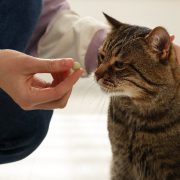A double‐blinded, randomized, methylprednisolone‐controlled study on the efficacy of oclacitinib in the management of pruritus in cats with nonflea nonfood‐induced hypersensitivity dermatitis
A double‐blinded, randomized, methylprednisolone‐controlled study on the efficacy of oclacitinib in the management of pruritus in cats with nonflea nonfood‐induced hypersensitivity dermatitis

Requires membership/payment
This article can be accessed via RCVS Knowledge Library Membership (click here).
In our edition of: Apr 2019
In our categories of: small animals
our summary:
Noli, C., Matricoti, I. and Schievano, C. (2019) A double-blinded, randomized, methylprednisolone-controlled study on the efficacy of oclacitinib in the management of pruritus in cats with nonflea nonfood-induced hypersensitivity dermatitis Veterinary Dermatology, 30 (2), pp. 110-e30
The aim of this randomised, double blind methylprednisolone-controlled study was to evaluate the effectiveness and safety of oclacitinib given at 1 mg/kg per os twice daily in cats with non-flea, non-food-induced hypersensitivity dermatitis (NFNFIHD).
Cats greater than 12 months of age and weighing more than 3 kg with NFNFIHD were recruited to the study. Cats were excluded if they had ectoparasitic diseases, bacterial or fungal infections or if flea-allergy dermatitis had been diagnosed. Cats were also excluded if they had received long acting injectable glucocorticoids, ciclosporin or essential fatty acids in the eight week prior to the study
All recruited cats had tested negative for feline immunodeficiency virus and feline leukaemia virus and received ectoparasite control for the four weeks prior to the study. Adverse food reaction was ruled out by means of an eight week dietary trial prior to the oclacitinib study commencing. Dietary changes and concurrent treatments were not allowed during the study period
Forty cats were recruited and allocated to Group A (20 cats) or Group B (20 cats) using a random block sequence. Cats in Group A weighing ≤ 4 kg were administered half a 5.4 mg oclacitinib tablet twice daily for 28 days and those weighing >4 kg one tablet. In Group B cats weighing ≤ 4 kg were administered half a 4 mg methylprednisolone tablet twice daily for 28 days and cats weighing > 4 kg received one tablet. Veterinarians responsible for the evaluation were blinded to treatment group.
Lesions were evaluated on day 0 and day 28 using the Scoring Feline Allergic Dermatitis (SCORFAD) scale, pruritus was scored by owners using a 10 cm long Visual Analogue Scale (VAS). Quality of life (QoL) for both owners and cats was evaluated by means of a questionnaire that had been validated for use with cats with skin diseases. Where permitted by owners haematological screening was carried out at day 1 and day 28.
Results show that cats in both groups showed improvement for all parameters measured. Although mean score improvement for both VAS and SCORFAD were higher in the methylprednisolone group and QoL score improvement was greater in the oclacitinib group these levels did not reach statistical significance. There were 5 non responders in Group A and 3 in Group B.
Limitations of the study were the short study period and the low number of cats in each group.
This paper shows that oclacitinib is an alternative treatment for cats with NFNFHID for whom glucocorticoids are contraindicated. Further studies to assess long term safety of the use of oclacitinib are encouraged.
Oclacitinib is not currently licensed for use in cats.
Image copyright attribute: Iuliia Vasileva
Join the discussion
We encourage discussion on all material highlighted in each edition of inFOCUS. Use the button below to join the conversation on Twitter and include your comment in the feed for this issue.






Leave a Reply
Want to join the discussion?Feel free to contribute!